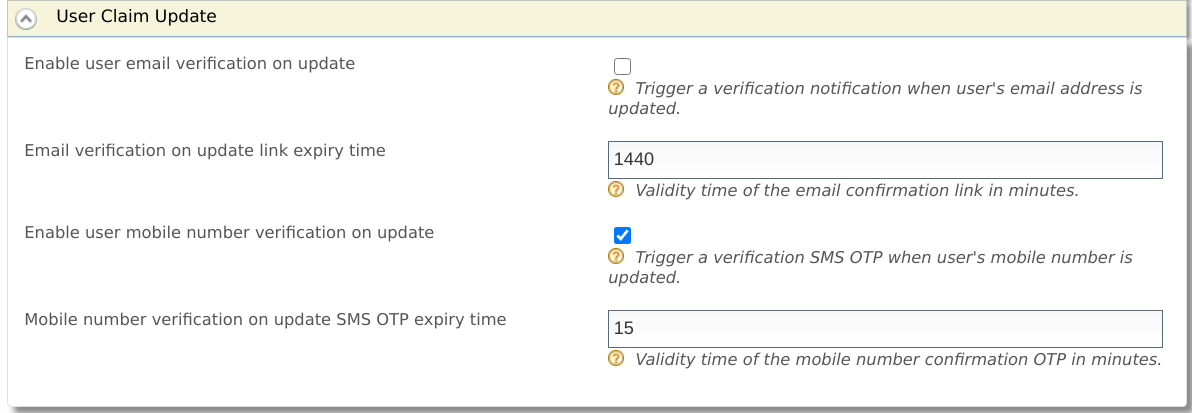Enable Mobile Number Verification for an Updated Mobile Number¶
This feature enables mobile number verification when the user updates the user profile with a new mobile number, so that the new mobile number can be taken into consideration for all further activities performed by the user.
When a user updates their mobile number in the user profile, an SMS OTP is sent to the new mobile number. Until the new mobile number is successfully verified, the existing mobile number of the user will not be overridden.
Important
- This feature can be invoked via a PUT/PATCH request to the SCIM 2.0 /Users endpoint or /Me endpoint.
- The verification on update capability is only supported for the
http://wso2.org/claims/mobileclaim. - An SMS OTP verification is not triggered if the mobile number to be updated is the same as the previously verified mobile number of the user.
- Sending the SMS OTP verification is skipped in the following instances:
- The
verifyMobileclaim is not set to true in the SCIM 2.0 request. - The claim update is invoked by a user other than the claim owner or a non-privileged user.
- The
- This feature only manages the verification flow internally. External verification capability is not offered.
Step 01 - Add an event publisher to send SMS¶
-
Add an event publisher to
IS_HOME/repository/deployment/server/eventpublishers. For this sample,HTTPOutputEventAdapter.xmlis used. The following sample publisher calls a REST Service to send confirmation codes.Sample Event Publisher
<?xml version="1.0" encoding="UTF-8"?> <eventPublisher name="HTTPOutputEventAdapter" processing="enable" statistics="disable" trace="disable" xmlns="http://wso2.org/carbon/eventpublisher"> <from streamName="id_gov_sms_notify_stream" version="1.0.0"/> <mapping customMapping="enable" type="json"> <inline>{"api_key":"4c9374", "api_secret":"FtqyPggE93", "from":"NEXMO", "to":{{send-to}}, "text":{{body}} }</inline> </mapping> <to eventAdapterType="http"> <property name="http.client.method">httpPost</property> <property name="http.url">https://rest.nexmo.com/sms/json</property> </to> </eventPublisher>Note
This publisher uses NEXMO as the SMS REST service provider. The
api_keyandapi_secretneeds to be replaced with the appropriate values copied from the NEXMO API Dashboard.
Step 02 - Enable the feature via the management console¶
-
On the management console, navigate to Main > Identity Providers > Resident > Other Settings > User Claim Update.
-
Select Enable user mobile number verification on update. Additionally, you can define the expiry time (in minutes) for the verification SMS OTP to match your requirement.

-
Click Update to save the changes.
Note
To enable this feature server-wide, follow the instructions given below.
- Shut down the server if it is running.
-
Add the following properties to the
deployment.tomlfile inIS_HOME/repository/confto enable the feature and to configure the verification OTP expiry time.[identity_mgt.user_claim_update.mobile] enable_verification = true verification_sms_otp_validity = "5" -
By default, mobile number verification is not allowed for privileged users. Add the following property to the above
deployment.tomlconfig to enable this server wide.[identity_mgt.user_claim_update.mobile] enable_verification_by_privileged_user = true -
Restart the server.
Try it out¶
Update the mobile number¶
Given below is a sample request and the relevant response for updating the mobile number via a PATCH operation to SCIM 2.0 Users endpoint.
Request
curl -v -k --user [username]:[password] -X PATCH -d '{"schemas":[],"Operations":[{"op":[operation],
"value":{[attributeName]:[attribute value]}}]}' --header "Content-Type:application/json" https://localhost:9443/scim2/Users/[user ID]Sample Request
curl -v -k --user bob:pass123 -X PATCH -d '{"schemas":["urn:ietf:params:scim:api:messages:2.0:PatchOp"],
"Operations":[{"op":"replace","value":{"urn:ietf:params:scim:schemas:extension:enterprise:2.0:User": {"verifyMobile": "true"},
"phoneNumbers":[{"type":"mobile","value":"0123456789"}]}}]}'
--header "Content-Type:application/json" https://localhost:9443/scim2/Users/1e624046-520c-4628-a245-091e04b03f21Sample Response
{
"emails": [
"bobsmith@abc.com"
],
"meta": {
"location": "https://localhost:9443/scim2/Users/6d433ee7-7cd4-47a3-810b-bc09023bc2ce",
"lastModified": "2020-10-12T13:35:24.579Z",
"resourceType": "User"
},
"schemas": [
"urn:ietf:params:scim:schemas:core:2.0:User",
"urn:ietf:params:scim:schemas:extension:enterprise:2.0:User"
],
"roles": [
{
"type": "default",
"value": "Internal/everyone"
}
],
"name": {
"givenName": "Bob",
"familyName": "Smith"
},
"id": "6d433ee7-7cd4-47a3-810b-bc09023bc2ce",
"userName": "bob123",
"phoneNumbers": [
{
"type": "mobile",
"value": "0111111111"
}
],
"urn:ietf:params:scim:schemas:extension:enterprise:2.0:User": {
"pendingMobileNumber": "0123456789"
}
}Upon receiving the response given above, the user will receive an SMS notification with a verification code to the new mobile number.
Validate the verification code¶
The user can submit the SMS OTP code using the validate-code API. Given below is a sample request and the relevant response to submit the received verification code.
Request
curl -k -v -X POST -H "Authorization: <Base64Encoded_username:password>" -H "Content-Type: application/json" -d
'{ "code": "<validation_code>","properties": []}' "https://localhost:9443/api/identity/user/v1.0/me/validate-code"Sample Request
curl -k -v -X POST -H "Authorization: Basic YWRtaW46YWRtaW4=" -H "Content-Type: application/json" -d '{ "code": "123https://iam-docs.m-ware.eu/en/6.1.0","properties": []}'
"https://localhost:9443/api/identity/user/v1.0/me/validate-code"Response
"HTTP/1.1 202 Accepted"Resend the verification code¶
The user can request to resend a new SMS OTP code using the resend-code API. Given below is a sample request and the relevant response to request a new verification code.
Request
curl -X POST -H "Authorization: Basic <Base64Encoded_username:password>" -H "Content-Type: application/json" -d '{"properties": []}'
"https://localhost:9443/api/identity/user/v1.0/me/resend-code"The verification scenario should be specified in the properties parameter of the request body as follows :
"properties": [{"key":"RecoveryScenario","value": "MOBILE_VERIFICATION_ON_UPDATE"}]Sample Request
curl -X POST -H "Authorization: Basic YWRtaW46YWRtaW4=" -H "Content-Type: application/json" -d '{"properties": [{"key":"RecoveryScenario","value": "MOBILE_VERIFICATION_ON_UPDATE"}]}'
"https://localhost:9443/api/identity/user/v1.0/me/resend-code"Response
"HTTP/1.1 201 Created"Additionally, you can use the following curl command to resend a new SMS OTP code by a privileged user.
Sample
Request
curl -X POST -H "Authorization: Basic <Base64Encoded_username:password>" -H "Content-Type: application/json" -d '{"user":{},"properties": []}'
"https://localhost:9443/api/identity/user/v1.0/resend-code"The user and the verification scenario should be specified in the request body as follows :
"user": {"username": "", "realm": ""}
"properties": [{"key":"RecoveryScenario", "value":"MOBILE_VERIFICATION_ON_UPDATE"}]}Sample Request
curl -X POST -H "Authorization: Basic YWRtaW46YWRtaW4=" -H "Content-Type: application/json" -d '{"user":{"username": "admin","realm": "PRIMARY"},"properties": [{"key":"RecoveryScenario","value":"MOBILE_VERIFICATION_ON_UPDATE"}]}' "https://localhost:9443/api/identity/user/v1.0/resend-code" -k -vResponse
"HTTP/1.1 201 Created"Related topics
See SCIM 2.0 Rest APIs for instructions on using SCIM 2.0 REST APIs.
For information on validate-code, and resend-code REST APIs, see the swagger docs on Self Registration REST APIs.